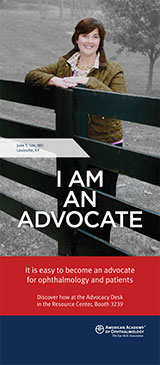 We all like to complain about what's wrong with ophthalmology and our health care system. Being an advocate gives me a voice, a strong and effective voice, allowing me to have more influence in the health-care-policy debate. Our elected officials spend so much time in our state or national capitals that they are out of touch, relying on staffers, think tanks and the news media for information. They need to know firsthand what is really going on back home in the health care world, and they need to know that they can count on us to keep them informed.
We all like to complain about what's wrong with ophthalmology and our health care system. Being an advocate gives me a voice, a strong and effective voice, allowing me to have more influence in the health-care-policy debate. Our elected officials spend so much time in our state or national capitals that they are out of touch, relying on staffers, think tanks and the news media for information. They need to know firsthand what is really going on back home in the health care world, and they need to know that they can count on us to keep them informed.
During last year's Mid-Year Forum, our small delegation from Kentucky had a relaxed conversation with Sen. Rand Paul, MD, about premium intraocular lenses, femtosecond lasers and Medicare policies. As an ophthalmologist, he seemed to enjoy talking shop, something he doesn't get to do very often in Washington. Sen. Mitch McConnell was also very welcoming to our advocacy group, lingering to ask us questions about the SGR, despite the not-so-subtle reminders from his staffers that he was behind schedule.
Yes, we all like to complain about what's wrong with ophthalmology and our health care system. Being an advocate is our unique opportunity to be a positive influence in the political process. We can hire lobbyists to speak for us, but no one else has our knowledge and understanding of what we and our patients face every day. It's up to us to speak up, be effective and get the message right.
Julie S. Lee, MD, is a cataract specialist in Louisville, Ky.